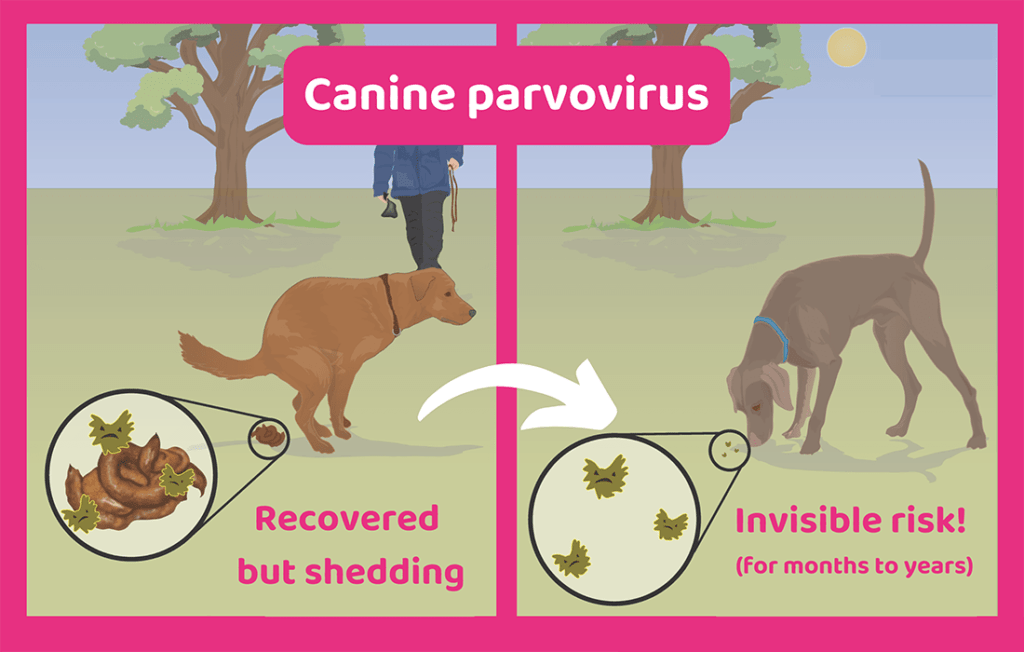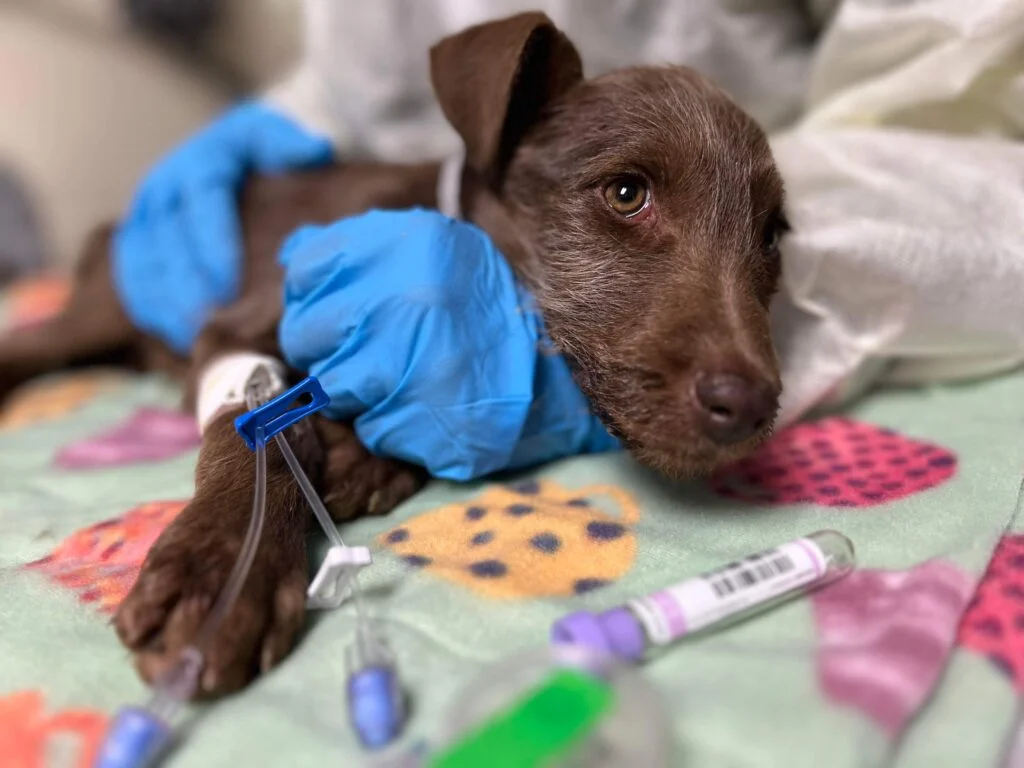Overzicht

Wat is parvovirus?
Parvovirus (ook bekend als Parvo, Canine Parvovirus of CPV) is een virus dat ernstige ziekte en dood bij honden veroorzaakt. Het beschadigt de voering van de darmen, waardoor ernstig braken en diarree veroorzaakt. Het valt ook infectiebestrijdingscellen aan in het beenmerg, waardoor het immuunsysteem verzwakt, waardoor het voor honden erg moeilijk is om te herstellen. Parvovirus is vooral serieus bij niet -gevaccineerde honden en puppy's minder dan zes maanden oud omdat hun immuunsysteem niet zo goed is ontwikkeld en dus minder in staat zijn om het virus te bestrijden.

Hoe worden honden Parvo?
De meeste honden vangen parvovirus terwijl ze uit zijn verkennen. Het wordt drie tot vier dagen nadat ze zijn geïnfecteerd in de poep van geïnfecteerde honden vergoten, en vervolgens een paar weken nadat hun symptomen zijn verdwenen. Helaas kan het vervolgens maanden tot jaren in de omgeving overleven - wat betekent dat het bijna overal kan worden gevonden waar honden naartoe gaan, zoals tuinen, parken en velden. Het kan ook in vuil reizen, dus te vinden op de bodem van schoenen, binnen huizen, op hondenkabels, kragen, kommen, kleding, speelgoed en zelfs op menselijke handen.
De meeste honden worden op een bepaald moment in hun leven blootgesteld aan parvovirus, dus de enige manier om ze te beschermen is door regelmatige vaccinatie.

Symptomen van parvo bij honden?
Symptomen van parvovirus duren meestal drie tot zeven dagen om te verschijnen en omvatten:
Diagnose van parvovirus bij honden?
Testen op parvo is niet altijd nodig omdat de symptomen meestal heel duidelijk zijn. Indien nodig kan het echter worden gediagnosticeerd met behulp van een snelle poo -test die een resultaat geeft in ongeveer 15 minuten. Deze test is meestal zeer nauwkeurig, maar als het resultaat niet is wat uw dierenarts verwachtte, willen ze het misschien controleren door wat poep weg te sturen naar een laboratorium.
Uw dierenarts kan ook bloedtesten uitvoeren om niveaus van infectiebestrijdingscellen te controleren en te testen op bloedarmoede door bloedverlies.
Wat zijn de behandelingsopties?
Er is geen remedie, dus honden met parvovirus hebben zeer intensieve zorg en medicijnen nodig om hun symptomen te beheersen terwijl hun lichaam probeert de infectie te bestrijden. Behandeling omvat meestal:
Zorg voor een hond die herstelt van parvovirus?
Als uw hond voldoende is hersteld om naar huis terug te keren, moet u ze blijven borstvoeding geven terwijl ze volledig herstellen:
Zal mijn hond Parvo overleven?
De kans van uw hond om parvovirus te overleven is veel hoger als u ze naar de dierenarts brengt zodra u symptomen opmerkt. Honden die een snelle intensive care ontvangen terwijl ze in het ziekenhuis zijn opgenomen in een veterinaire praktijk, hebben veel meer kans om te overleven, maar helaas sterven door de ernst van parvovirus, sommigen zelfs met behandeling. Parvovirus is bijna altijd fataal zonder behandeling. Puppy's lopen meer het risico om te sterven, vooral die van minder dan twee weken oud.
Wanneer moet u contact opnemen met uw dierenarts?
Neem onmiddellijk contact op met uw dierenarts als uw hond symptomen van parvovirus vertoont. Laat ze weten dat je denkt dat het misschien parvo is en wacht buiten de kliniek totdat je hond wordt ingeschakeld om te voorkomen dat je het naar andere honden in de wachtkamer verspreidt.
Het is niet nodig om contact op te nemen met uw dierenarts als uw hond gewoon in contact is gekomen met parvovirus, volgt u ze gewoon nauwlettend op symptomen en belt u uw dierenarts op advies als u zich zorgen maakt.
Parvovirus voorkomen?
Vaccinaties - De beste en enige manier om parvovirusinfectie te voorkomen, is door uw hond regelmatig te vaccineren. Ze hebben twee tot drie Parvovirus -vaccins nodig terwijl ze een puppy zijn en vervolgens de rest van hun leven regelmatig boosters.
Koop/herhaling verantwoordelijk - Koop altijd bij een verantwoordelijke fokker of een gerenommeerd rehomingcentrum. Zorg ervoor dat je je puppy en hun broers en zussen met hun moeder ziet, in de plaats waar ze zijn opgevoed, meer dan eens. Alle puppy's moeten gezond en helder zijn zonder tekenen van ziekte, en hun moeder zou up -to -date moeten zijn met haar vaccins.
Een nieuwe puppy meenemen - Niet -gevaccineerde puppy's en puppy's die alleen hun eerste injectie hebben gehad, lopen het risico parvovirus te vangen. Je puppy zal veilig zijn om te wandelen en andere honden te ontmoeten een tot twee weken nadat ze hun eerste vaccinatiecursus hebben voltooid, dus volg het hieronder advies:
De kosten voor het behandelen van parvovirus?
Parvovirus kan honderden, zo niet duizenden dirhams kosten om te behandelen omdat de meeste honden meerdere dagen intensieve behandeling in een veterinair ziekenhuis nodig hebben. Het is belangrijk om openlijk op uw dierenarts te spreken over uw financiën, de kosten van de behandeling, en wat u denkt dat geschikt is voor uw hond.
Hoe lang moet ik wachten om een puppy te krijgen na het verliezen van een hond aan parvovirus?
Als je onlangs een hond aan parvovirus hebt verloren, zal het virus lang daarna in je huis en tuin overleven. Het kan maanden tot jaren in de omgeving blijven en het is bijna onmogelijk om ervoor te zorgen dat je van alles af bent, vooral in gebieden die moeilijk te desinfecteren zijn, zoals de tuin. Dit betekent dat alle niet -gevaccineerde honden/puppy's die bij u thuis komen, het risico lopen parvovirus te vangen.
Als u overweegt om een nieuwe puppy te krijgen, raden we u aan te wachten tot ze volledig zijn gevaccineerd voordat u ze naar huis brengt (u moet ervoor zorgen dat ze goed worden gesocialiseerd door de fokker/reddingscentrum). Als dit geen optie is, kunt u het risico verminderen dat ze parvovirus vangen door uw huis grondig te desinfecteren en ze uit uw tuin te houden totdat ze volledig zijn gevaccineerd - spreek uw dierenarts voor meer advies en lees hieronder hoe u parvovirus kunt desinfecteren.
Hoe desinfecteren na parvovirus?
Het is belangrijk om alle gebieden die zijn besmet met parvovirus volledig te desinfecteren.
Bleach kan parvovirus doden wanneer het correct wordt gebruikt. Het is direct beschikbaar en is relatief goedkoop, maar heeft enkele nadelen. Het kan oppervlakken verkleuren of zelfs verpesten. De dampen kunnen irritant zijn voor de neus, ogen en huid.
Om honden parvovirus op harde niet-poreuze oppervlakken te doden, bereid je een oplossing van bleekmiddel met water voor. Voorweek de gebieden vooraf en dweilen vervolgens of veeg met de desinfecterende oplossing. Laat tien minuten staan, spoel dan grondig en lucht droog. Eén behandeling moet het virus doden zolang u de juiste verdunning gebruikt en tien minuten contacttijd toestaat. Voor deze situatie zouden we ook een nieuw gekochte fles bleekmiddel gebruiken om er zeker van te zijn dat de Bleach Active op de labelsterkte is. Gebruik geen fles bleekmiddel die te lang rondhielt, want na verloop van tijd breekt het bleekmiddel natuurlijk af in zout en water.
Krijg antwoorden op parvovirus veel voorkomende vragen.

| Koekje | Duur | Beschrijving |
|---|---|---|
| cookielawinfo-checkbox-analytics | 11 maanden | This cookie is set by GDPR Cookie Consent plugin. The cookie is used to store the user consent for the cookies in the category "Analytics". |
| cookielawinfo-checkbox-functioneel | 11 maanden | The cookie is set by GDPR cookie consent to record the user consent for the cookies in the category "Functional". |
| cookielawinfo-checkbox-noodzakelijk | 11 maanden | This cookie is set by GDPR Cookie Consent plugin. The cookies is used to store the user consent for the cookies in the category "Necessary". |
| cookielawinfo-checkbox-anderen | 11 maanden | This cookie is set by GDPR Cookie Consent plugin. The cookie is used to store the user consent for the cookies in the category "Other. |
| cookielawinfo-checkbox-prestaties | 11 maanden | This cookie is set by GDPR Cookie Consent plugin. The cookie is used to store the user consent for the cookies in the category "Performance". |
| bekeken_cookie_beleid | 11 maanden | De cookie wordt ingesteld door de AVG Cookie Consent-plug-in en wordt gebruikt om op te slaan of de gebruiker al dan niet toestemming heeft gegeven voor het gebruik van cookies. Er worden geen persoonlijke gegevens opgeslagen. |